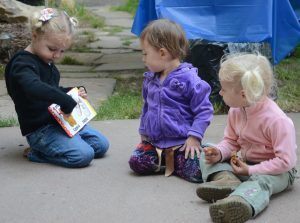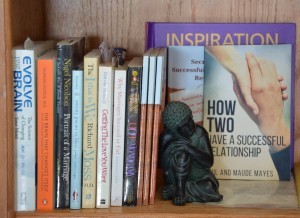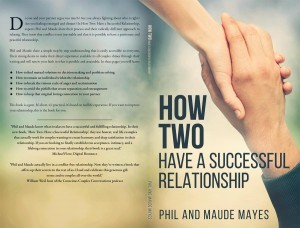Maude Mayes's Blog: Secrets of a Successful Relationship Revealed, page 100
May 11, 2016
Successful Relationships Reading Corner
This week’s blog was how our approach to relationships applies to all relationships, not just romantic ones. This was a hard subject for which to find articles! We hope you enjoy these.
Conflict Resolution Skills “Conflict arises from differences, both large and small. It occurs whenever people disagree over their values, motivations, perceptions, ideas, or desires. Sometimes these differences appear trivial, but when a conflict triggers strong feelings, a deep personal need is often at the core of the problem. These needs can be a need to feel safe and secure, a need to feel respected and valued, or a need for greater closeness and intimacy.”
Why Some Parents & their Children have Great Friendships “There are many reasons why some adults get along with their kids better than others. In this article, I will provide a short overview of the common explanations which have emerged whilst professionally mediating the relationship between parents and their children, as well as observations in my personal life and society in general.”
Conflict – Couple Relationships, Family Relationships, Parent-child Relationships “Three characteristics distinguish family conflict from other types: intensity, complexity, and the duration of relationships. Work on family conflict has led to some important findings relevant to prevention and treatment.”


May 8, 2016
How to Make all Your Relationships More Successful
 Now that our book “How Two: Have a Successful Relationship” is out, we’ve been having some really interesting conversations with different people about the book.
Now that our book “How Two: Have a Successful Relationship” is out, we’ve been having some really interesting conversations with different people about the book.
One of our close friends recently said “There is nothing in your book for me. I am single by choice and very happy that way.” The very same day another dear friend who is also single let us know she had gotten her copy delivered and was reading it. “I’m finding the basic tenets of the book quite interesting. I’ve been thinking about how I can use them in my relationship with my mother, and I can see where many of these things would be great applied to our relationship. I’m going to lend her my book when I’m done, and then see how we can use it. Our core values match, but the big thing for her will be seeing that we are on the same side. It seems that we are always in conflict about who is right.”
One of the basic goals in our book is spreading peace one relationship at a time and effecting change in the world toward peace in this way. Although the information in the book is geared toward couples, much of what is suggested can be applied to other close relationships: parents, children, close friendships, etc.
Sometimes, people have different core values from you and there are irreconcilable differences on certain subjects, but the antidote is to look at what you have in common, rather than the differences. We are all human; we all need food and sleep and shelter and recognition.
We start our book by writing about acceptance, and when you practice that, several things happen. Firstly, you give up the struggle to change someone. That’s a whole lot of work you don’t have to do. Now usually we’re trying to change the other person because we aren’t comfortable with some aspect of their behavior – they complain too much or wear strong perfume or make unreasonable demands – and it might appear that the downside of not trying to control this is having to accept it. But there is a hidden benefit in this: you get the opportunity to look at why this behavior is upsetting to you.
Another aspect of acceptance is that the other person feels accepted. You might see this as a trite tautology, but by accepting the other person, you make them feel comfortable, you offer a place for them to be themselves.
We’re not suggesting total compliance here. When faced with a demanding person, you don’t have to acquiesce to their demands; resist them as necessary, but accept that being a demanding person is part of their nature, and don’t struggle to change that.
One important part of our book is a process to resolve disagreements. It is very important not to attack the other person by saying “You…,” but instead, to offer your reality by saying “I feel….” This does several things. It avoids the retaliatory response that makes arguments escalate. It is an act of personal exposure that invites closeness and empathy. It gives you an opportunity to be clear to yourself about your needs and to find what deeper ones there may be. Lastly, it provides material for both of you to craft a possible mutual solution.
Other important things to remember during discussions are:
Let go of needing to be right.
Don’t make lists or keep score.
Remember you are on the same side
Seek mutual solutions
Be open to the concept of creating together different solutions
Practice active listening
If you have a relationship that you want to change from one filled with conflict to one of peace, you will find many useful and practical suggestions in “How Two.” Whether you are trying to find better communication with your relatives or friends or your lover, the same principles can be applied.


May 4, 2016
Successful Relationships Reading Corner
This week’s blog was on why words are as important as deeds in a relationship. Here are some good articles on different aspects of this topic.
9 Steps to Better Communication Today “The most popular myth about communication in relationships is that since you talk to your partner, you’re automatically communicating. While talking to your partner is indeed a form of communication, if it’s primarily about everyday, “surfacey” topics (“How were the kids?” “How was work?” “How’s your mother?”), you’re not really communicating about the important stuff. This article is primarily about how to talk in a more open and rewarding manner with your significant other.”
6 TOXIC RELATIONSHIP HABITS MOST PEOPLE THINK ARE NORMAL “Fortunately, there’s been a lot of psychological research into healthy and happy relationships the past few decades and there are some general principles that keep popping up consistently that most people are unaware of or don’t follow. In fact, some of these principles actually go against what is traditionally considered “romantic” or normal in a relationship.”
How to Be Happy in a Relationship: Speak from the Heart “Here is the sad and somewhat ironic thing about not being able to speak from your heart: First, you’re actually hurting your loved one because you’re not revealing your true self — you’re hiding things that will one day come back to bite you.”
P.S. Our new book “How Two: Have a Successful Relationship” just came out. Order it now!


May 1, 2016
Words Are as Important as Deeds in a Relationship
 What you say in a relationship can be as important as what you do.
What you say in a relationship can be as important as what you do.
Language and words have power and can diffuse a situation or set off a bomb. They can bring about transformative experiences, or cause repetition of the same old negative patterns that tear asunder partnerships.
Learning to communicate truthfully with love and respect is primary to the success of any and all relationships.
Speak Clearly
A Story
In my twenties, I loved playing with language. I used puns, allusions, parody, satire and irony to amuse myself and serve as a status symbol to demonstrate my intelligence and wit.
I learned a lesson I shall never forget when I made a satirical comment to a six year old. She took it literally, and I realized with horror that saying the opposite of what is intended can be misunderstood. I vowed never to do it again.
Do not encrypt your message and hope the listener has the key. Always use plaintext.
Speak Personally
There is a world of difference between saying “You make me so anxious when you don’t call,” and “I feel so anxious when you don’t call.” The crucial difference is one of blame vs. responsibility. “You make me X when Y” makes it the other person’s fault, with the implication that they must change their behavior to correct the situation. “I am X when you Y” carries no such implication. In both cases, you are revealing something about yourself, and as both people do this, the situation changes and by continuing in this way, a resolution is nearly always possible.
Speak Honestly
Most of us have learned to filter our words, to have enough social grace not to offend others. We’ve learned that our internal thoughts and feelings can upset people. Yet in a personal relationship, we must change this pattern and reveal all; if we keep something hidden, we cannot feel fully seen and accepted. Social mores may be so ingrained that this is difficult, but for a successful relationship, it is critical that we reveal ourselves as we come to trust the other person.
Speak Kindly
In all this forthrightness, do not let the flood of the self injure the other person. If there are words that hurt, let them be words of truth, and phrase them no more harshly than necessary to be clear. Words of attack are never justified; instead examine the pain that provokes them and use it to learn about yourself.
Don’t Push Buttons
We all have buttons that set us off; words or phrases that bring up old associations or meanings that are not really in the present. They reside in us for so long that we may not even be aware of what they are. Learn what these areas are for yourself and your partner. Avoid phrases and words that will push buttons. The goal is not to injure with our words, but to show acceptance, acknowledgement and appreciation.
When you are communicating, always bear in mind you are both on the same side. You may have differing opinions or ideas, but you both want the best for each other and a resolution of problems that makes both of you feel good and happy. Seek mutual solutions and use language that is supportive and reminds you that you are both together working to solve something.


April 27, 2016
Successful Relationships Reading Corner
 This week we blogged about why we wrote our new book, and we can’t find any links about that! So instead, here are some excerpts from our new book, “How Two: Have a Successful Relationship.”
This week we blogged about why we wrote our new book, and we can’t find any links about that! So instead, here are some excerpts from our new book, “How Two: Have a Successful Relationship.”
Another Way
We live a conflict-free relationship. It’s been more than a decade now full of peace, love, joy and passion. Friends check in with us every so often: “So you still haven’t had any arguments?” The answer is always “No.”
Acceptance
Squabbles in a relationship are like stones in your shoes; they don’t have to be there.
Individuality
One of the keys to a peaceful and joyous way of relating is to accept and respect each other as two separate and absolutely unique individuals. In our relationship, this is a critical part of how we are with each other.
When there is something we need to agree on, whether it be a decision we have to make or a problem that needs to be resolved, we have found a way of dealing with it that does not involve any struggle or conflict.
Being Present
Being present means paying attention to what is actually happening. We get on so well because we practice this with each other; what is in the moment is more important to us than what has happened or what might happen.
Sexuality, Intimacy and Union
For us, as for many couples, sexuality is a place where we have a direct experience of union – a sense that we have merged to form one body. The sense of self as an individual, separate experience still remains, but there is this additional sense of connectedness. Sex is like a step-ladder; it enables us to reach a higher place, a vista of union that transcends the physical.
Peace
One of the most surprising aspects of our relationship is the direct experience of peace that it engenders. This follows naturally from the alternatives to conflict that we practice. For us, peace is not a void described by the absence of conflict, anger or war. Peace is an actual experience.


April 24, 2016
Why Did We Write How Two: Have a Successful Relationship?
 With our new book coming out next week, it’s a good time to share our personal reasons for writing it and how it came about.
With our new book coming out next week, it’s a good time to share our personal reasons for writing it and how it came about.
Every relationship starts out well, and so did ours. As it continued, we were both struck by the sense that it was different and unusual, that it had a peaceful nature that was not circumstantial, but intrinsic. It had qualities that seemed remarkable, and we began to talk about just what they were, groping for words to describe them. We tried to break down what the elements were to this kind of relating, and to help us, we began a private blog where we wrote back and forth to each other for several years. (We used pseudonyms, and you can read it here.)
It was clear early on that this was a grace, a gift, and that we had an obligation to share it with others. We felt a deep responsibility to pass on the information that such a conflict-free way of being together, one filled with a profound sense of peace, was possible for everyone. We became convinced that this new way of looking at relationship possibilities could actually change the nature of how people relate and thereby contribute to bringing peace into the world.
How we would share this information wasn’t clear at first, but we chose to write a book, and looked through the several hundred posts we had made to identify the major themes. This wasn’t easy, as everything was connected to everything else, but islands emerged out of the sea of words and resulted in our first book “Secrets of a Successful Relationship Revealed.” We took care to make the book a description of what is possible, and left people to see how to reach it by themselves, everyone being different. We didn’t want to break our own rules and tell people what to do. But the feedback we got was “How?”
Since that book’s publication, we have continued to explore this wonderful way of being, looking more closely at what we do and don’t do to create it, and so “How Two” was born. We are more convinced than ever that we are talking about a real, tangible experience of peace. We hope that by sharing this that some will realize that it is possible, and will therefore make the transformation that brings peace both into their relationship and into the world.


April 20, 2016
Successful Relationships Reading Corner
This week’s blog was on how differences need not be problems, and how knowing yourself is a key to achieving this. Here are some articles on these areas.
Marriage: 7 Ways to be more accepting of your spouse “When you’re happy and fulfilled as an individual, you’ll be less critical of your partner. You are 100% capable of meeting your own needs. This takes a lot of pressure off the marriage. It boils down to personal responsibility for self-love. If you love yourself and are responsible for your own happiness, you’re able to love your partner simply for being your partner instead of seeing your partner as a need-meeter.”
20 Things You Must Accept If You Want Your Relationship To Succeed “Acceptance is what will get you through to the other side. Acceptance doesn’t mean resignation; it means understanding that something is what it is and that you can choose it for exactly what it is. Because when you do choose it for what it is and what it isn’t, it brings something entirely new into your world.”
How the Differences in Your Relationship Can Be Gifts “When relationships reach a rocky patch or fail altogether, it’s easy to cite another person’s flaws as the culprit. Pointing fingers is, after all, far easier than self-examination. Yet, if you recognize that all your relationships, romantic or otherwise, serve as a mirror for yourself, you’d realize that these “flaws” are present in you too. Getting angry or irritated after recognizing them in someone else means that you are denying them in yourself and not fully accepting the “bad” with the “good.””
Share0Share0
April 17, 2016
Knowing Yourself Helps You Have a Successful Relationship

Dolls by Nicole Turofsky
Maude is away this weekend being Nana (and loving it!), so I’m flying solo in this week’s blog. Time and time again we describe our relationship as peaceful and free of conflict and hear “That’s nice for you, but…,” so I’d like to address that here. Yes, it’s true that we agree on politics; neither of us are cleanliness freaks; we like the same music; we’d rather take serendipitous trips than plan every detail in advance. But there are a number of differences as well: Maude watches a lot of TV series that I don’t; she’s a Urantia book reader and I’m a kinda Zen Buddhist; she likes to print out online confirmations and I like to save paper.
Yet our differences don’t come close to being problems. We have a great quote by Andy Warhol in our new book: “Sometimes people let the same problem make them miserable for years when they could just say, So What. That’s one of my favorite things to say. So What.” Treat differences with your partner the same way. If they do bug you, that’s your problem not theirs. You have work to do. Search behind the emotions and see what you find.
Meditation is a great tool in this area. By quieting the mind it makes space for emotions to arise, and by permitting them, deeper feelings can in turn surface. Allowing them in and sitting with them but not acting on them lets them dissipate, and teaches the valuable lesson that you can have feelings without acting on them.
Sometimes you won’t be able to let go and say So What. That’s OK too; maybe it means you have discovered an important value for yourself, what we call a core value. If printing an online confirmation is anathema to you because you are a committed environmentalist, good for you. (But make a note that one of your behaviors is to impose your rules for living on other people.) Being able to determine the importance of your dislikes is an aspect of knowing yourself. For the first 20 years of our life, we are told what to think and how to eat, and are then summarily released into the world. It is hard to realize that these are not our ideas, and to find our own true beliefs.
To dig deeper, look for a sense of discomfort in certain situations. For instance, the ethics of colleagues at the office may make you uncomfortable. Lots of clues here: who you want to be friends with, how you should act personally, what kind of work you should take part in. You may not recognize this discomfort and what you should take from it at the time; it’s usually only in retrospect that you can assess what the right actions should have been, but such discomfort is very often a potential learning experience. Say thank you to life for these teaching moments!
It’s a lifetime’s work finding these values and learning to live them. It involves growing our empathy and diminishing the ego (which fits right in with the research showing that helping others brings more happiness than helping yourself.)
The more we have a sense of what values are important, the less weight we put on the small things in life. That is how Maude and I get on so peacefully. We thrive on the support and respect we give each other, and everything else becomes circumstantial entertainment.
Share0Share0
April 13, 2016
Successful Relationships Reading Corner
Last week’s blog discussed how a relationship becomes filled with peace when there is no conflict. We feel this is such an important topic that we are including further links that discuss it.
What Makes Conflict? How Are Conflicts Resolved? “What is conflict? Conflict is disagreement, but contrary to popular belief conflict does not necessarily involve fighting. As I explain in my book From Conflict to Resolution, conflict exists in any situation where facts, desires or fears pull or push participants against each other or in divergent directions.”
Six Steps for Resolving Conflicts “Mark learned that conflicts don’t need to be volatile and negative. Conflicts can actually lead to increased understanding and creative thinking. It’s how we deal with conflict that determines the outcome.”
The Dos and Don’ts of Arguing: My Tips for Keeping the Peace in Your Relationship “Don’t get me wrong, I am not Mr. Perfect. I’ve made some big mistakes when it comes to conflict resolution in relationships. I mean, we all have our moments—it’s only human. But I began to notice that most of my conflict was caused by miscommunication.”
Share0Share0
April 10, 2016
Great News About How Two: Have a Successful Relationship
Wow. The date of the first draft tells us our new book How Two: Have a Successful Relationship has been nearly two years in the making. But it’s finally ready, and the Kindle ebook will be available for pre-order this coming Friday April 15th. Order it for only $3.95 (half the regular price of $7.95) and you can be the first to read it when it’s released on May 3rd.
Phil and Maude know what it takes to have a successful and fulfilling relationship. In their new book, How Two: Have a Successful Relationship, they use honest, real life examples that actually work for couples wanting to create harmony and deep satisfaction in their relationship. If you are looking to finally establish true acceptance, intimacy, and a lifelong connection in your relationship, their book is a great read.
Michael Fiore, Digital Romance
And here’s a foretaste of How Two: Have a Successful Relationship:
Another Way
We live a conflct-free relationship. It’s been more than a decade now full of peace, love, joy and passion. Friends check in with us every so often: “So you still haven’t had any arguments?” The answer is always “No.”
Acceptance
Squabbles in a relationship are like stones in your shoes; they don’t have to be there.
Individuality
One of the keys to a peaceful and joyous way of relating is to accept and respect each other as two separate and absolutely unique individuals. In our relationship, this is a critical part of how we are with each other.
When there is something we need to agree on, whether it be a decision we have to make or a problem that needs to be resolved, we have found a way of dealing with it that does not involve any struggle or conflict.
Being Present
Being present means paying attention to what is actually happening. We get on so well because we practice this with each other; what is in the moment is more important to us than what has happened or what might happen.
Sexuality, Intimacy and Union
For us, as for many couples, sexuality is a place where we have a direct experience of union – a sense that we have merged to form one body. The sense of self as an individual, separate experience still remains, but there is this additional sense of connectedness. Sex is like a step-ladder; it enables us to reach a higher place, a vista of union that transcends the physical.
Peace
One of the most surprising aspects of our relationship is the direct experience of peace that it engenders. This follows naturally from the alternatives to conflict that we practice. For us, peace is not a void described by the absence of conflict, anger or war. Peace is an actual experience.
Share0Share2
Secrets of a Successful Relationship Revealed
We use this blog to continue the exploration of the magic that can be found in a relationship, and the wider implications of peace for the world. ...more
- Maude Mayes's profile
- 8 followers





